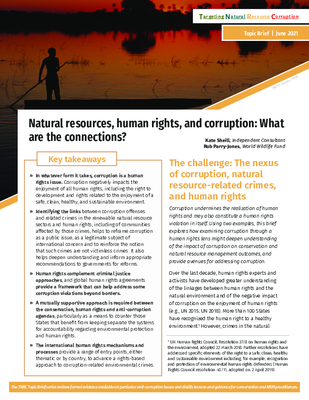Natural Resources, Human Rights, and Corruption: What Are the Connections?

Corruption undermines the realization of human rights and may also constitute a human rights violation in itself.
Using two examples, this brief explores how examining corruption through a human rights lens might deepen understanding of the impact of corruption on conservation and natural resource management outcomes, and provide avenues for addressing corruption.
Key Takeaways:
- In whatever form it takes, corruption is a human rights issue. Corruption negatively impacts the enjoyment of all human rights, including the right to development and rights related to the enjoyment of a safe, clean, healthy, and sustainable environment.
- Identifying the links between corruption offenses and related crimes in the renewable natural resource sectors and human rights, including of communities affected by those crimes, helps to reframe corruption as a public issue, as a legitimate subject of international concern and to reinforce the notion that such crimes are not victimless crimes. It also helps deepen understanding and inform appropriate recommendations to governments for reforms.
- Human rights complement criminal justice approaches, and global human rights agreements provide a framework that can help address some corruption violations beyond borders.
- A mutually supportive approach is required between the conservation, human rights and anti-corruption agendas, particularly as a means to counter those States that benefit from keeping separate the systems for accountability regarding environmental protection and human rights.
- The international human rights mechanisms and processes provide a range of entry points, either thematic or by country, to advance a rights-based approach to corruption-related environmental crimes.


